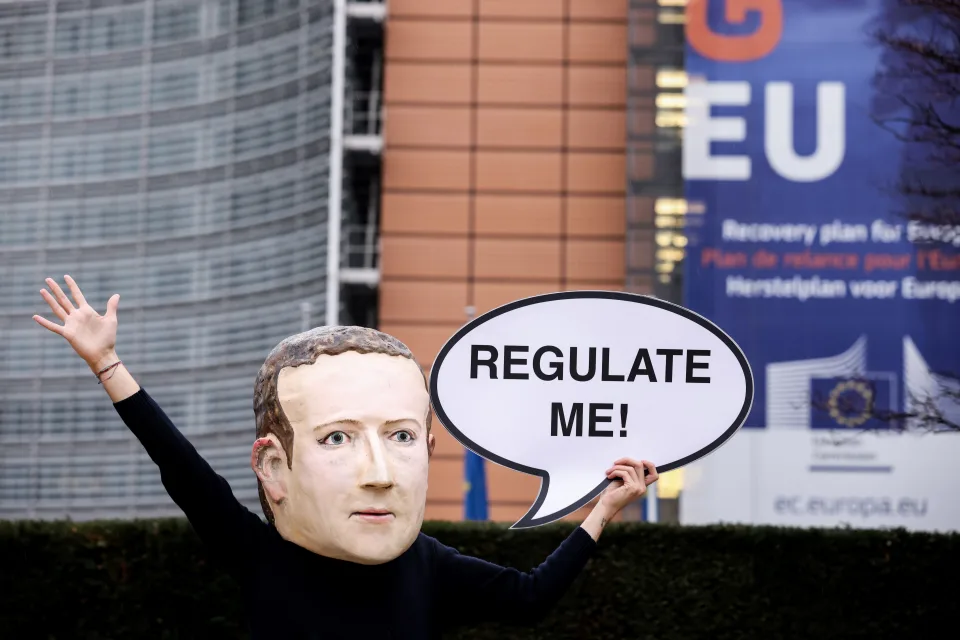In a notable shift, tech companies this year have made unexpected concessions that were previously considered unthinkable. Apple, for instance, agreed to adopt the RCS protocol, facilitating text message interoperability with Android devices. Furthermore, after more than a decade, Apple abandoned the lightning port in its latest iPhone. Meta responded by providing some users with the option to opt out of targeted advertising through a monthly subscription. Platforms like TikTok, Meta, and Snap took it a step further, allowing certain users to entirely opt out of their recommendation algorithms.
The catalyst for these changes can be attributed to the increasing pressure exerted by the European Union (EU). Renowned for leading the charge in regulating “Big Tech,” the EU saw the fruition of some of its longstanding efforts in 2023.
A significant outcome of heightened EU regulations became apparent with the release of the iPhone 15 lineup. This marked the first instance of Apple embracing USB-C instead of its proprietary lightning port. While Apple might have eventually made this transition independently, it occurred in 2023 as a direct response to a European law mandating USB-C as the universal charging standard.
“We have no choice as we do around the world but to comply with local laws,” stated Apple executive Greg Joswiak last year regarding regulations that mandated all new phones and mobile devices to adopt USB-C by the end of 2024.
Similarly, the widely held belief is that Apple’s decision to finally support the RCS standard in iMessage was influenced by political pressure within the European Union (EU). Historically resistant to RCS, which would modernize text messages between iPhone users and their “green bubble” Android-using counterparts, Apple’s shift is seen as a response to the political will within the EU.
While Apple has not publicly disclosed the specific reasons for its change in stance, it is speculated that Google and other companies urged EU authorities to regulate iMessage as a “gatekeeper” service under the Digital Markets Act (DMA). Apple’s unexpected announcement of RCS support coincided with the deadline for companies to challenge the EU’s gatekeeper rules. This reversal on RCS could be seen as an effort by Apple to appease EU regulators, potentially avoiding more stringent measures, such as requiring iMessage to be fully interoperable with other chat apps like WhatsApp.
Interestingly, the positive changes resulting from EU-specific regulations are expected to benefit users in the United States as well. Carolina Milanesi, a consumer analyst with Creative Strategies, emphasized the higher degree of consumer protection in Europe compared to the US. These robust protections often have a ripple effect, extending to other regions due to the impracticality of implementing different standards across geographies.
Apart from the advancements brought about by the Digital Markets Act (DMA), major social media platforms, including Facebook, TikTok, Twitter, YouTube, Snapchat, and Instagram, are now subject to the Digital Services Act, another EU law that took effect this year. Under this legislation, these companies are mandated to provide detailed disclosures about disinformation and other harmful content, in addition to explaining the workings of their recommendation algorithms.
Paul Barrett, deputy director of NYU’s Stern Center for Business and Human Rights, points out that compelling the social media industry to disclose its inner workings creates an incentive for responsible behavior and self-regulation. The transparency required by these regulations can act as a deterrent against misbehavior, fostering a more accountable and regulated environment within the industry.
The impact of these measures on the improvement of services for users remains uncertain, with questions lingering about how effectively the rules will be enforced. However, there have been discernible changes for social media users based in the European Union.
Notably, Snapchat, Meta, and TikTok now afford European users the option to opt out of their recommendation algorithms entirely. Snapchat has taken an additional step by discontinuing most targeted advertising for users aged 13 to 17 within the EU. Meta, in response to regulatory pressure, has been compelled to permit EU users to opt out of targeted advertising or even choose no advertising at all, albeit for a substantial monthly subscription fee.
While these changes might not appear revolutionary on the surface, they strike at the core of these companies’ business models. Left to self-regulate, as has been the approach of U.S. policymakers, it is unlikely that these companies would have voluntarily taken actions against their own economic interests. The regulatory interventions in the EU, therefore, are prompting shifts in business practices that align more closely with user interests and privacy concerns.




